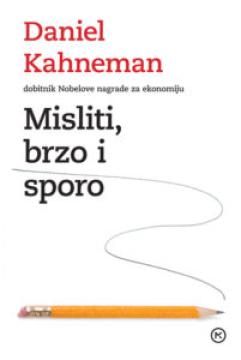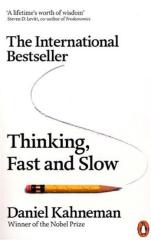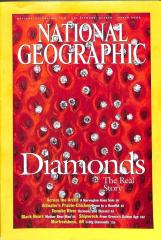
Misliti, brzo i sporo
„Denken, schnell und langsam“ ist ein monumentales Werk des berühmten Nobelpreisträgers und eines der bedeutendsten Psychologen der Welt. Schnelles und langsames Denken wird die Art und Weise verändern, wie wir es gewohnt sind, über das Denken nachzudenke
Der Nobelpreisträger für Wirtschaftswissenschaften, Daniel Kahneman, untersuchte in seiner innovativen Arbeit auf dem Gebiet der Psychologie das rationale Modell der Urteils- und Entscheidungsfindung. Er ist einer der bedeutendsten Denker der Gegenwart, dessen Ideen und Errungenschaften viele Bereiche menschlichen Handelns beeinflusst haben – Unternehmenswirtschaft, Medizin und Politik. Bis zu diesem Buch hat er seine Forschungen und Überlegungen nicht an einem Ort zusammengefasst.
In dem Buch Thinking, Fast and Slow nimmt uns Kahneman mit auf eine Reise, die die Grundlagen der Funktionsweise unseres Geistes enthüllt. Es wird erklärt, wie die beiden Systeme funktionieren, die unser Denken antreiben und die Art und Weise, wie wir Entscheidungen treffen. System 1 ist schnell, intuitiv und emotional. System 2 ist langsamer, beratender, rationaler und logischer.
Kahneman enthüllt seine ungewöhnliche Fähigkeit, schnell zu denken – aber auch seine falschen Vorstellungen und Vorurteile. Gleichzeitig warnt er vor dem großen Einfluss, den intuitive Eindrücke auf unsere Gedanken und Entscheidungen haben. Die Rolle des Optimismus bei der Eröffnung eines neuen Unternehmens, die Bedeutung einer guten Vorhersage möglicher Risiken zu Hause und am Arbeitsplatz, Schwierigkeiten bei der Vorhersage dessen, was uns in Zukunft glücklich machen wird, die Illusion einer Expertenmeinung ... All dies kann nur verstanden werden, wenn wir wissen, wie die beiden Systeme bei der Gestaltung unserer Einschätzungen und Entscheidungen zusammenarbeiten.
Im Angebot sind keine Exemplare vorhanden
Das letzte Exemplar wurde kürzlich verkauft.





